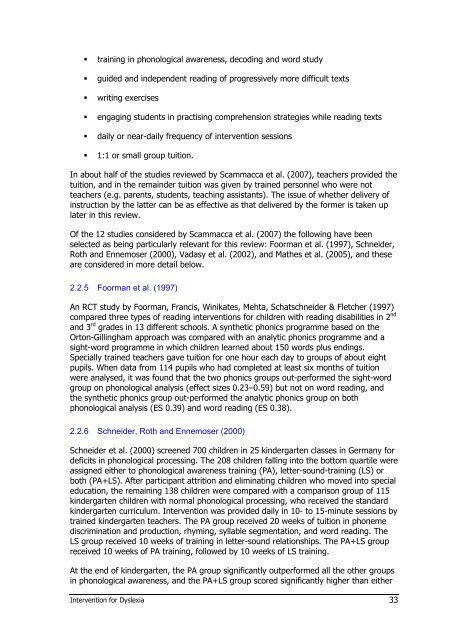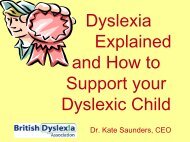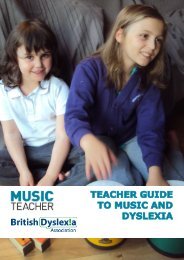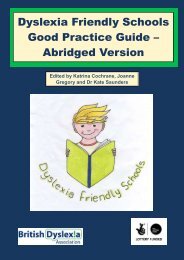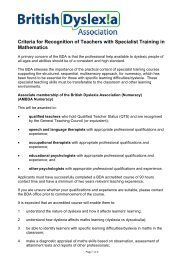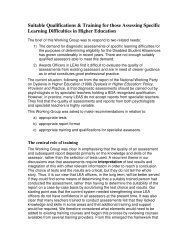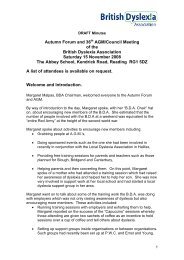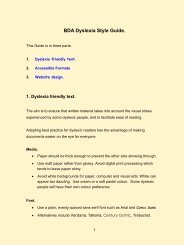Intervention for Dyslexia - The British Dyslexia Association
Intervention for Dyslexia - The British Dyslexia Association
Intervention for Dyslexia - The British Dyslexia Association
You also want an ePaper? Increase the reach of your titles
YUMPU automatically turns print PDFs into web optimized ePapers that Google loves.
training in phonological awareness, decoding and word study<br />
guided and independent reading of progressively more difficult texts<br />
writing exercises<br />
engaging students in practising comprehension strategies while reading texts<br />
daily or near-daily frequency of intervention sessions<br />
1:1 or small group tuition.<br />
In about half of the studies reviewed by Scammacca et al. (2007), teachers provided the<br />
tuition, and in the remainder tuition was given by trained personnel who were not<br />
teachers (e.g. parents, students, teaching assistants). <strong>The</strong> issue of whether delivery of<br />
instruction by the latter can be as effective as that delivered by the <strong>for</strong>mer is taken up<br />
later in this review.<br />
Of the 12 studies considered by Scammacca et al. (2007) the following have been<br />
selected as being particularly relevant <strong>for</strong> this review: Foorman et al. (1997), Schneider,<br />
Roth and Ennemoser (2000), Vadasy et al. (2002), and Mathes et al. (2005), and these<br />
are considered in more detail below.<br />
2.2.5 Foorman et al. (1997)<br />
An RCT study by Foorman, Francis, Winikates, Mehta, Schatschneider & Fletcher (1997)<br />
compared three types of reading interventions <strong>for</strong> children with reading disabilities in 2 nd<br />
and 3 rd grades in 13 different schools. A synthetic phonics programme based on the<br />
Orton-Gillingham approach was compared with an analytic phonics programme and a<br />
sight-word programme in which children learned about 150 words plus endings.<br />
Specially trained teachers gave tuition <strong>for</strong> one hour each day to groups of about eight<br />
pupils. When data from 114 pupils who had completed at least six months of tuition<br />
were analysed, it was found that the two phonics groups out-per<strong>for</strong>med the sight-word<br />
group on phonological analysis (effect sizes 0.23–0.59) but not on word reading, and<br />
the synthetic phonics group out-per<strong>for</strong>med the analytic phonics group on both<br />
phonological analysis (ES 0.39) and word reading (ES 0.38).<br />
2.2.6 Schneider, Roth and Ennemoser (2000)<br />
Schneider et al. (2000) screened 700 children in 25 kindergarten classes in Germany <strong>for</strong><br />
deficits in phonological processing. <strong>The</strong> 208 children falling into the bottom quartile were<br />
assigned either to phonological awareness training (PA), letter-sound-training (LS) or<br />
both (PA+LS). After participant attrition and eliminating children who moved into special<br />
education, the remaining 138 children were compared with a comparison group of 115<br />
kindergarten children with normal phonological processing, who received the standard<br />
kindergarten curriculum. <strong>Intervention</strong> was provided daily in 10- to 15-minute sessions by<br />
trained kindergarten teachers. <strong>The</strong> PA group received 20 weeks of tuition in phoneme<br />
discrimination and production, rhyming, syllable segmentation, and word reading. <strong>The</strong><br />
LS group received 10 weeks of training in letter-sound relationships. <strong>The</strong> PA+LS group<br />
received 10 weeks of PA training, followed by 10 weeks of LS training.<br />
At the end of kindergarten, the PA group significantly outper<strong>for</strong>med all the other groups<br />
in phonological awareness, and the PA+LS group scored significantly higher than either<br />
<strong>Intervention</strong> <strong>for</strong> <strong>Dyslexia</strong> 33


